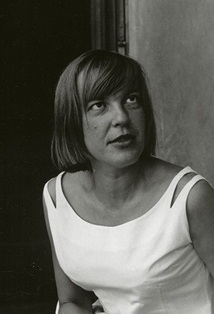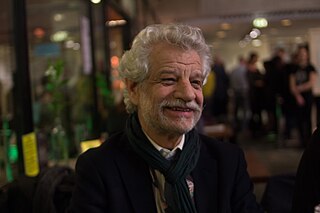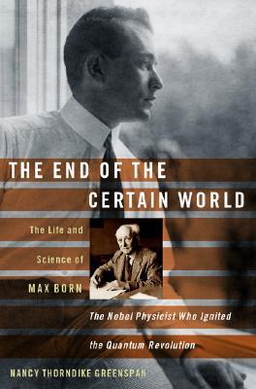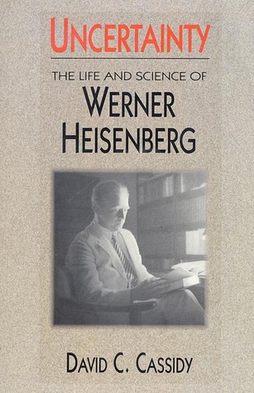
A propaganda film is a film that involves some form of propaganda. Propaganda films spread and promote certain ideas that are usually religious, political, or cultural in nature. A propaganda film is made with the intent that the viewer will adopt the position promoted by the propagator and eventually take action towards making those ideas widely accepted. Propaganda films are popular mediums of propaganda due to their ability to easily reach a large audience in a short amount of time. They are also able to come in a variety of film types such as documentary, non-fiction, and newsreel, making it even easier to provide subjective content that may be deliberately misleading.

Ingeborg Bachmann was an Austrian poet and author. She is regarded as one of the major voices of German-language literature in the 20th century. In 1963, she was nominated for the Nobel Prize in Literature by German philologist Harald Patzer.

A newsreel is a form of short documentary film, containing news stories and items of topical interest, that was prevalent between the 1910s and the mid 1970s. Typically presented in a cinema, newsreels were a source of current affairs, information, and entertainment for millions of moviegoers. Newsreels were typically exhibited preceding a feature film, but there were also dedicated newsreel theaters in many major cities in the 1930s and ’40s, and some large city cinemas also included a smaller theaterette where newsreels were screened continuously throughout the day.
New German Cinema is a period in German cinema which lasted from 1962 to 1982, in which a new generation of directors emerged who, working with low budgets, and influenced by the French New Wave and Italian Neorealism, gained notice by producing a number of "small" motion pictures that caught the attention of art house audiences. These filmmakers included Percy Adlon, Harun Farocki, Rainer Werner Fassbinder, Peter Fleischmann, Werner Herzog, Alexander Kluge, Ulli Lommel, Wolfgang Petersen, Volker Schlöndorff, Helma Sanders-Brahms, Werner Schroeter, Hans-Jürgen Syberberg, Margarethe von Trotta and Wim Wenders. As a result of the attention they garnered, they were able to create better-financed productions which were backed by the big US studios. However, most of these larger films were commercial failures and the movement was heavily dependent on subsidies. By 1977, 80% of a budget for a typical German film was ensured by a subsidy.

Law and economics, or economic analysis of law, is the application of microeconomic theory to the analysis of law. The field emerged in the United States during the early 1960s, primarily from the work of scholars from the Chicago school of economics such as Aaron Director, George Stigler, and Ronald Coase. The field uses economics concepts to explain the effects of laws, to assess which legal rules are economically efficient, and to predict which legal rules will be promulgated. There are two major branches of law and economics; one based on the application of the methods and theories of neoclassical economics to the positive and normative analysis of the law, and a second branch which focuses on an institutional analysis of law and legal institutions, with a broader focus on economic, political, and social outcomes, and overlapping with analyses of the institutions of politics and governance.

Film studies is an academic discipline that deals with various theoretical, historical, and critical approaches to cinema as an art form and a medium. It is sometimes subsumed within media studies and is often compared to television studies.

From Caligari to Hitler: A Psychological History of the German Film is a book by film critic and writer Siegfried Kracauer, published in 1947.

The Marriage of Maria Braun is a 1978 West German drama film directed by Rainer Werner Fassbinder. The film stars Hanna Schygulla as Maria, whose marriage to the soldier Hermann remains unfulfilled due to World War II and his post-war imprisonment. Maria adapts to the realities of post-war Germany and becomes the wealthy mistress of an industrialist, all that while staying true to her love for Hermann.

The Making of the Atomic Bomb is a history book written by the American journalist and historian Richard Rhodes, first published by Simon & Schuster in 1987. The book won multiple awards, including Pulitzer Prize for General Non-Fiction. The narrative covers people and events from early 20th century discoveries leading to the science of nuclear fission, through the Manhattan Project and the atomic bombings of Hiroshima and Nagasaki.
Debórah Dwork is an American historian, specializing in the history of the Holocaust. She is the Founding Director of the Strassler Center for Holocaust and Genocide Studies and formerly served as the Rose Professor of Holocaust History at Clark University in Worcester, Massachusetts.

Thomas Elsaesser was a German film historian and professor of Film and Television Studies at the University of Amsterdam. He was also the writer and director of The Sun Island, a documentary essay film about his grandfather, the architect Martin Elsaesser. He was married to scholar Silvia Vega-Llona.
I Was Nineteen is a 1968 East German film produced by Konrad Wolf for the DEFA studio.

Germany in Autumn is a 1978 West German anthology film about the period of 1977 known as the German Autumn, which was dominated by incidents of terrorism. The film is composed of contributions from different filmmakers, including Rainer Werner Fassbinder, Alexander Kluge, Edgar Reitz, Bernhard Sinkel, Alf Brustellin, Hans Peter Cloos, Katja Rupé, Peter Schubert and Volker Schlöndorff. It was entered into the 28th Berlin International Film Festival, where it won a Special Recognition award.
The following is a timeline of the history of the city of Lusaka, Zambia.
Argila is a 1968 West German drama film directed by Werner Schroeter and starring Carla Egerer, Magdalena Montezuma and Sigurd Salto. The film was part of the developing New German Cinema movement, and along with Eika Katappa established Magdalena Montezuma as the star of German underground filmmaking.
Judith Weisenfeld is an American scholar of religion. She is Agate Brown and George L. Collord Professor of Religion at Princeton University, where she is also the Chair of the Department of Religion. Her research primarily focuses on African-American religion in the first half of the 20th century. In 2019, Weisenfeld was elected to the American Academy of Arts and Sciences.

The Kulturverlag Kadmos is a non-fiction and fiction publishing house founded in Berlin in 1995.

The End of the Certain World: The Life and Science of Max Born is a biography of Max Born by Nancy Thorndike Greenspan that was initially published in 2005 by Basic Books. It was the first book-length biography of Born, a Nobel laureate and one of the founders of quantum mechanics. The book was critically acclaimed and was reviewed by Publishers Weekly, David C. Cassidy, Kurt Gottfried, Graham Farmelo, and Cathryn Carson, among others.

Uncertainty: the Life and Science of Werner Heisenberg is a biography by David C. Cassidy documenting the life and science of Werner Heisenberg, one of the founders of quantum mechanics. The book was published in 1992 by W. H. Freeman and Company while an updated and popularized version was published in 2009 under the title Beyond Uncertainty: Heisenberg, Quantum Physics, and The Bomb. The book is named after the quantum mechanics concept known as Heisenberg's uncertainty principle. It has been reviewed many times and was generally well received.
Robert Phillip Kolker is an American film historian, theorist, and critic. He has authored and edited a number of influential books on cinema and media studies. He is a Professor Emeritus at the University of Maryland, College Park.













